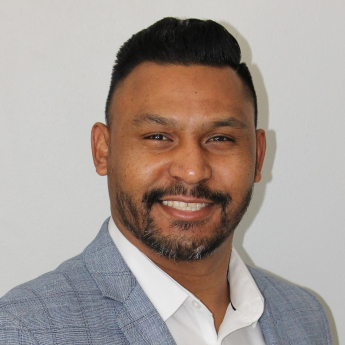Twenty years after starting his journey in higher education, Kurt de Bique, Senior HR Business Partner & Learning Manager, Africa for A.P. Moller – Maersk, has turned his love of learning into a career focused on developing business leaders for the African continent.
“What I see a lot in my job, is people needing an opportunity to develop and gain skills, they need to be given the chance to fine-tune their leadership presence and learn how to show up in the workplace,” says Kurt, who followed his BSc. in Psychology and Public Administration with a PGDip in Management Practice at the UCT GSB in 2009 and a further HR qualification at the University of Michigan in the US.
Kurt started his career at the South African Management Development Institute and went on to work for Chevron, ultimately becoming a Senior HR Business Partner South Africa. He has been in his current position of Senior HR Business Partner & Learning Manager, Africa for A.P. Moller – Maersk for over three years and during this time, he has helped hundreds of young Africans gain the skills they need to advance into leadership roles. Two-thirds of the Moller – Maersk’s country managers in Africa are currently Africans – a significant achievement, he believes, because “Africa should be led by Africans.” More importantly, he says, the company has hit its target of 40 percent female representation at senior management level across Africa.
A.P. Moller – Maersk is the second biggest container shipping company in the world, operating in over 130 countries with 95 000 employees and Kurt explains that the company sees diversity and inclusion – in the broadest sense of diversity of culture, gender, sexual orientation and thought – as critical to its sustainability agenda. A diverse, equitable and inclusive work environment improves the social impact of a company which is an important aspect of extending its licence to operate.
This can sometimes take colourful forms. In 2021, the company had two shipping containers painted in rainbow colours, to show its support for the LGBTQ+ community. The brightly coloured shipping containers were then put to work, travelling to ports around the world, getting people talking about gender diversity and issues pertaining to it.
“The company may be 118 years old, but it is extremely agile and responsive,” says Kurt. What started out as an initiative of only two containers has resulted in such a positive response that 15 more rainbow containers have been ordered for manufacture.
Based in Cape Town, Kurt has a raft of responsibilities from developing people strategies to recruitment and training on the ground. Of all the things he does, it his involvement in training, specifically with the Africa Leadership Development Programme – an internal programme designed for Maersk’s emerging leaders – that he feels most strongly about, because it is here that he sees the policies of HR brought to life as people come into their own and grow. For him, the crux of leadership development is individual growth.
“It is not so much about giving people confidence as guiding individuals to learning more about themselves. It does not matter what culture you are from, what matters is how you come across as a leader, if you lead from a place of authenticity,” he says.
“There may be a perception that an individual must blend in. My job is to tell them, no, stand out, be yourself. But look at how you do that.” He believes that facing up to biases is one of the most important things a business leader can do, especially one who works in international contexts. “We are continuously engaging with people from other backgrounds, where the level of development and the access to education and opportunity, amongst other things, can be vastly different. Leaders need to be socially aware, and they must be sensitive to cultural nuances.”
Kurt, who is married and the father of two girls, has lived in the US and worked and travelled in many countries across the world. But he loves living in South Africa because of its diversity and working with Africa’s future business leaders because of the impact he feels he can make. “I see learning as the key to everything, not only to how we improve ourselves and our own lives, but also in terms of socio-economic development on the continent and improving the lives of millions of Africans.”
























































































































